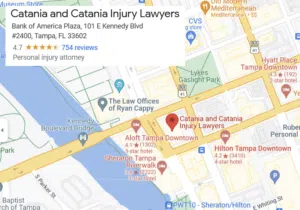
Most personal injury claims are settled out of court. The parties agree to the terms of settlement through negotiations, mediation, or arbitration. The settlement agreement resolves all questions related to the injury claim, including fault and compensation for damages.
A personal injury lawsuit is litigated in a courtroom. The judge and jury decide questions of law and fact. The jury ultimately determines whether the defendant is financially responsible for the plaintiff’s injuries and damages.
In court, the plaintiff has the burden of proving that the defendant’s conduct caused their injuries and damages. The burden of proof for personal injury cases in Florida is “a preponderance of the evidence.”
A preponderance of the evidence is a lower burden of proof than “beyond a reasonable doubt” (used in criminal cases). However, proving punitive damages in a personal injury case requires proving the claim by clear and convincing evidence, which is higher than a preponderance of the evidence.
Table of Contents
What Does Preponderance of the Evidence Mean?
A preponderance of the evidence means that the jury believes the defendant is more likely than not at fault for the plaintiff’s injuries based on the evidence presented during the trial. In other words, the jurors believe that there is a greater than 50 percent chance that the plaintiff’s version of the facts is true.
Evidence that might be presented at trial includes, but is not limited to:
- Physical evidence, such as parts from a defective product or skid marks on the road at a car accident scene
- Testimony from the parties involved in the case
- Eyewitness testimony
- Testimony from experts, such as engineers, physicians, accident reconstructionists, researchers, economists, etc.
- Medical records and health care records
- Evidence of financial losses, including lost income, medical bills, personal care costs, etc.
There may be other types of evidence used at trial, depending on the case. However, all evidence must follow the Florida Rules of Evidence.
The Burden of Proof for Punitive Damages
Punitive damages are rarely awarded in a personal injury case. This type of damage “punishes” the defendant for gross misconduct. The plaintiff receives the money even though the award is not compensating the plaintiff for economic or non-economic damages.
However, when a case warrants punitive damages, the burden of proof is higher than the proof for the other damages in the case.
Florida Statute §768.72 states that the burden of proof for punitive damages is clear and convincing evidence. The plaintiff must prove that it is substantially and highly more likely than not that the defendant engaged in gross negligence or intentional misconduct.
The Burden of Proof Can Shift to the Defendant
Under the legal theory of negligence per se, the burden of proof in a personal injury case can shift from the plaintiff to the defendant. For this to occur, the plaintiff must prove that the defendant committed a criminal act as part of the breach of duty.
The criminal act must be a crime of public interest. In other words, the law was designed to protect the public. The crime must also carry a punishment if the person were convicted.
For example, driving under the influence of alcohol is a crime. If a defendant causes a collision while he is intoxicated, the plaintiff could allege negligence per se. The burden of proof shifts to the defendant to prove they did not cause the car crash.
What Do I Need to Prove in a Personal Injury Case?
Most personal injury claims filed in Florida are based on negligence. Negligence is the failure to act with the same level of care that a reasonable person would have used in a similar situation.
For example, a person who runs a red light by speeding up to “beat the light” would probably be considered negligent by a jury. Jurors are the ones who decide whether conduct meets the “reasonableness” standard.
However, you also need to prove each legal element of a negligence claim to recover compensation for your damages. If you cannot link each element together to create causation, you lose your case.
The elements of a negligence claim are:
- The person who caused the accident or your injury owed you a duty of care
- The person breached the duty of care by failing to meet the reasonable person standard
- The breach of duty was a direct and proximate cause of your injury
- You sustained damages because of the injury
A person could breach the duty of care but win the case if you cannot prove that the breach caused your injury. Therefore, causation becomes one of the most critical aspects of many personal injury cases.
Contact Our Florida Personal Injury Lawyers for a Free Consultation
Accidents and other negligent acts cause a wide variety of injuries and damages. You deserve to receive just and fair compensation for your injuries and damages when another person hurts you.
Our Florida personal injury attorneys at Catania and Catania Injury Lawyers can help you. Call us at (813) 222-8656 or contact our law office in Tampa to schedule your free consultation with an injury attorney for a no-cost case review.




